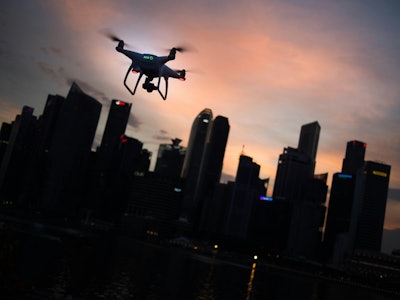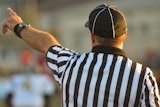
The NFL, MLB, NCAA and NASCAR said they support a bill introduced in Congress on Thursday that would give state and local law enforcement the ability to disable drones during sporting events, which the leagues say have become an increasing threat.
The Disabling Enemy Flight Entry and Neutralizing Suspect Equipment (DEFENSE) Act is co-sponsored by Senators Tom Cotton (R-Arkansas) and Jacky Rosen (D-Nevada) and would provide "the tools for local and state law enforcement to protect citizens," Cotton told ESPN.
"Local law enforcement already protects the perimeter of these events," he said. "We already expect them to stop a dump truck that would cause harm, so we need to also give them the tools to protect the airspace from weapons and biological threats."
Currently, only federal law enforcement can disable unauthorized drones on the sites of such events as the Super Bowl, the World Series, the Rose Bowl and the Boston Marathon. Nearly all other major sporting events, including thousands of NFL and MLB games, do not have officials on-site with the legal authorization to quickly remove a drone threat, ESPN's Tisha Thompson reported.
Cotton said federal agents represent "a small fraction of law enforcement" and that there are "not enough" to man large-scale sporting events on-site. "They need these local and state authorities to protect the restricted airspace," he said.
In a press release, Cotton's office said the four leagues endorsed the bill, as did the Southeastern Conference.
"If enacted, this legislation would dramatically increase the security of our stadiums and the safety of the 70,000,000 fans who attend our games annually," MLB's senior vice president of security and ballpark operations David Thomas said in a statement, as reported by ESPN.
The NFL said that in the 2023 season alone, it experienced more than 2,800 drone incursions into the temporary restricted airspace around its stadiums, which the FAA defines as below 3,000 feet and within three nautical miles of the stadium from one hour before until one hour after the game.
"The NFL paused the AFC Championship Game in January 2024 between the Baltimore Ravens and the Kansas City Chiefs after a drone entered the stadium's restricted airspace. The drone operator pleaded guilty to violating national defense airspace," ESPN's Thompson wrote. "More recently, on Jan. 11, a wild-card game between the Ravens and Pittsburgh Steelers was temporarily suspended when a drone flew over the bowl of M&T Bank Stadium. That alleged drone operator is facing multiple federal charges."
Related: Ravens-Steelers Game Paused After Drone Spotted Over Stadium
"Many drones around large athletic events are hobbyists or enthusiasts or practical jokers," Cotton said. "But we can't take the risk of fan lives because some of these drones can be equipped to carry explosives or most chillingly can be equipped with some kind of biological weapon."
The new bill would apply only to sporting events that already have temporary flight restrictions, including stadiums and ballparks with more than 30,000 people and outdoor gatherings with more than 100,000 people. That would include all NFL, MLB and NCAA Division I football games, NASCAR, IndyCar and Champ Series races.
Related: Following Ohio State Drone Incident, NFL and Congress Express Concerns
The bill would require eligible law enforcement officers to complete counter-drone training and mandate federal agencies to create a list of approved drone mitigation technology.
If a drone's operator can't be found and convinced to land the device, law enforcement can jam a drone's radio frequency, grab it with a net, ram it with another drone or shoot it out of the sky, Michael Robbins, president and CEO of the Association for Uncrewed Vehicle Systems International, a trade association that represents the drone industry, told ESPN. Most commercially available drones are programmed to land or return to their point of origin if they lose their link to the operator.
The leagues have been lobbying Congress for a number of years to expand law enforcement's ability to disable drones, Thompson reported.
"For several years, the NCAA has expressed concern for the threat that unauthorized drones pose at NCAA championships and college sporting events," said Tim Buckley, the NCAA's senior vice president of external affairs, in a statement to ESPN. "The safety of the competitors, fans, and staff that work at NCAA events is our top priority."





































